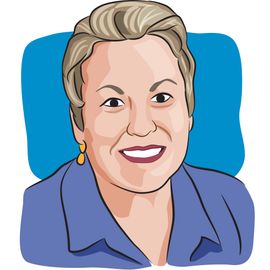- About Us
- Advertise / Support
- Editorial Board
- Contact Us
- CancerNetwork.com
- TargetedOnc.com
- OncLive.com
- OncNursingNews.com
- Terms & Conditions
- Privacy
- Do Not Sell My Information
- Washington My Health My Data
© 2025 MJH Life Sciences™ and CURE - Oncology & Cancer News for Patients & Caregivers. All rights reserved.
Nursing Through the Prism of Childhood

Kathy LaTour is a breast cancer survivor, author of The Breast Cancer Companion and co-founder of CURE magazine. While cancer did not take her life, she has given it willingly to educate, empower and enlighten the newly diagnosed and those who care for them.
An interview with Extraordinary Healer finalist, ELIZABETH DAVIS, B.S.N., RN, CPN.
Growing up in Memphis, Tennessee, Elizabeth Davis always knew that nurses and doctors at St. Jude Children’s Research Hospital cared for critically ill youngsters. Today, the hospital is the only workplace she has ever known.
With five years’ experience, Davis is a relatively new nurse, but her colleagues recognize her dogged determination to work for her patients and their families through a variety of councils, committees and projects. During a fellowship at St. Jude, for example, she explored better ways for children to communicate their nausea levels by using the Baxter Animated Retching Faces scale, an undertaking that reflects the values of a hospital committed to shared decision making.
“It is one of those things that (makes) you ask, ‘How did we not think of this before?’” says Davis, 27. “It is not a yes or no but a scale the kids are living on every day. Zero means no nausea and 10 is serious nausea and vomiting.”
After her project was finished and presented, it was implemented throughout the hospital, and Davis decided to stay in the fellowship role to mentor the nurses coming after her. “I helped the nurse who nominated me with her project, which looked at how nurses deal with fatigue while working,” she says.
Davis recognizes that many outside the hospital setting who hear about her job conclude that they could not deal with the pain of children and their families.
Davis handles this tough situation by giving her patients the best days she can, no matter what those days are like. “I try to understand this through the prism of childhood,” she says.
Due to her work, Davis understands what children are capable of, and, in her estimation, they do not get enough credit. For example, some parents hold back health information from their children, particularly when the news is bad.
“The kids know, and they want to protect their parents. Near the end of life, they will be so worried about how their parents will take it,” Davis says. “They aren’t scared. They tell me they are going home to see Jesus, and they are excited. I have seen kids who see angels and talk about their loved ones who have died before them.”
The field of oncology seemed a natural fit for Davis from the first time she treated a patient. Since then, she has worked with patients from all over the world and looks forward to helping many more.
“The nurse who nominated me is the one I want to grow up and be,” Davis says. “She has the same drive to improve care. She is incredibly involved on many hospital committees, and she is inspiring. She is so special and opens her heart to every patient and caregiver.”
Related Content:



